Florida, known for its stunning beaches, vibrant culture, and diverse wildlife, also holds a unique distinction – it’s a haven for vultures.
The sight of vultures soaring in the Florida skies is a common occurrence, leaving many to wonder: why are there so many vultures in Florida?
In this article, we embark on a fascinating journey to unravel the secrets behind the thriving vulture population in Florida.
From the iconic turkey vulture to the striking black vulture, these carrion-eating birds have found a welcoming habitat in Florida’s diverse ecosystems.
Join us as we delve into the ecological and environmental factors that have contributed to the vulture abundance, the crucial roles these scavengers play in maintaining ecosystem health, and the coexistence of these remarkable birds with the dynamic Florida landscape.
Discover the intriguing story of vultures in Florida, where these often misunderstood creatures are not just tolerated but embraced for their essential ecological role.
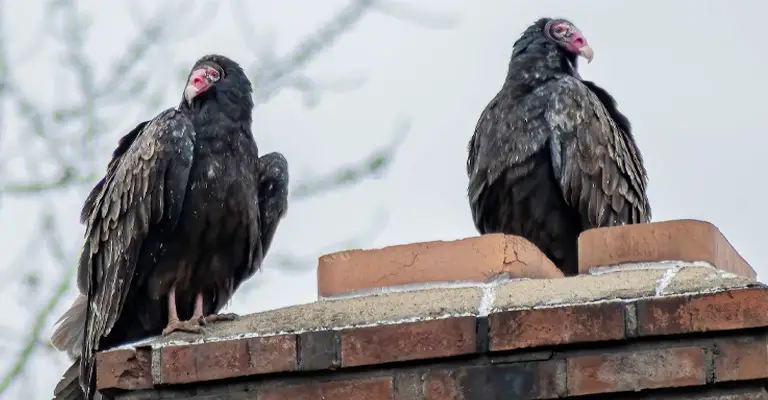
Why Are There So Many Vultures in Florida?
One of the key factors that attract vultures to Florida is the abundance of carrion or dead animals. Carrion forms a significant part of the vulture diet, and Florida’s diverse ecosystems provide ample opportunities for scavenging.
The state’s mix of wetlands, forests, grasslands, and coastal areas hosts a wide range of wildlife, from mammals and reptiles to birds and marine life.
When these animals die, vultures play a vital role in recycling nutrients by feeding on the remains, thereby preventing the spread of disease. This abundance of carrion resources provides a consistent and reliable food source for vultures. Here are other reasons:
Warm Climate and Year-Round Activity
Florida’s warm and temperate climate is another factor that attracts vultures. Unlike some regions with harsh winters, Florida provides a hospitable environment for vultures year-round.
This allows them to maintain a constant presence without the need for long-distance migrations. The year-round activity ensures that vultures can remain in Florida to take advantage of the food sources available throughout the seasons.
Protected Status
Vultures in the United States, including Florida, are protected by federal laws like the Migratory Bird Treaty Act. This protection has played a role in the increasing vulture population.
Vultures do not face the same hunting pressures as other birds of prey, such as hawks and eagles. The legal protection of vultures ensures their safety and preservation in Florida.
Roosting and Nesting Sites
Vultures need suitable roosting and nesting sites, and Florida offers a variety of habitats that meet these requirements. Vultures often choose remote and secluded locations for roosting and nesting to minimize disturbances and avoid human activity.
Florida’s extensive wetlands, forests, and uninhabited areas provide ideal locations for vultures to establish their nests and roosts. The state’s numerous trees, cliffs, and abandoned buildings offer the necessary perches and shelter that vultures seek.
Lack of Natural Predators
Vultures have few natural predators. Their large size and communal behavior make them challenging targets for other animals.
In Florida, there are relatively few species that can pose a threat to vultures, contributing to their population’s stability and growth.
Habitat Diversity
Florida’s diverse range of ecosystems provides vultures with an array of potential food sources. From coastal areas with fish and marine life to inland regions with mammals and reptiles, vultures have adapted to take advantage of the rich tapestry of habitats available in the state.
This adaptability allows them to thrive in various environments, contributing to their widespread presence.
Adaptability and Resilience
Vultures are highly adaptable birds. They are known for their keen scavenging abilities, which allow them to find food in a variety of conditions.
They can feed on carrion that has been exposed to the elements for extended periods, making them well-suited to Florida’s diverse landscape.
Low Human Disturbance
Vultures tend to avoid areas with high human activity and disturbance. While they can adapt to urban environments, they prefer quieter and less populated areas for roosting and nesting.
Many parts of Florida offer remote and undisturbed locations that are suitable for vultures, further encouraging their presence.
How Many Vultures Are in Florida?
The exact number of vultures in Florida is difficult to determine with precision due to their mobile and wide-ranging nature. Vulture populations can vary throughout the year based on factors like food availability, environmental conditions, and nesting success.
However, several vulture species are commonly found in Florida, contributing to the overall vulture population in the state. Let’s explore these vulture species and their presence in Florida.
Black Vulture (Coragyps atratus)
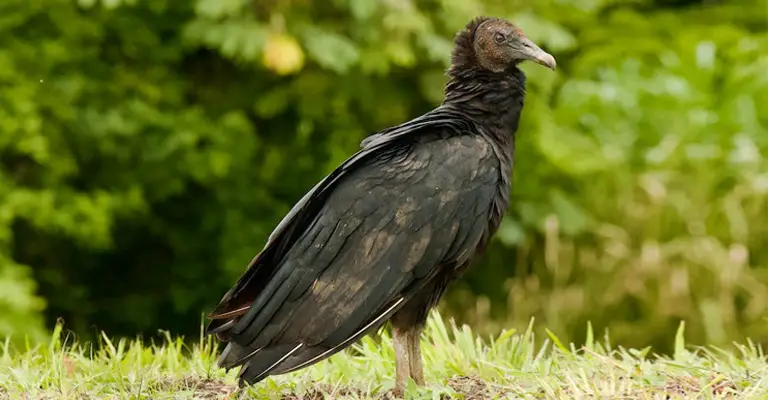
Black vultures are a common vulture species in Florida, known for their distinctive black plumage and bald, grayish-black heads. These birds are often seen in both urban and rural areas. They are opportunistic scavengers and play a crucial role in cleaning up carrion.
Their populations can fluctuate seasonally, with numbers increasing during the winter months when migratory birds and other animals provide additional food sources.
Turkey Vulture (Cathartes aura)
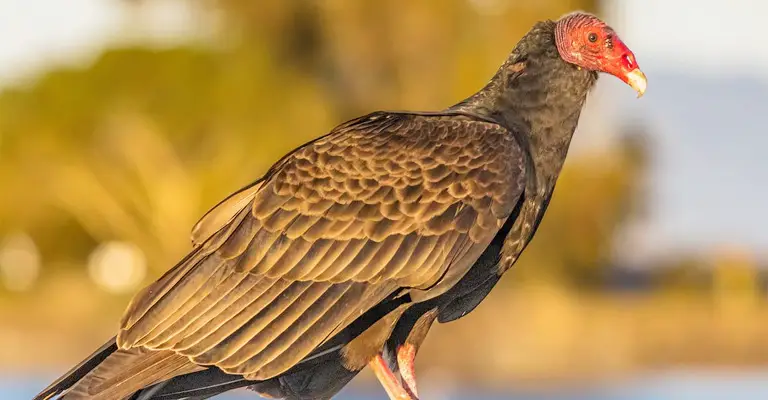
Turkey vultures are another prevalent vulture species in Florida. They are known for their reddish-pink heads and are often seen soaring in the sky, utilizing their keen sense of smell to locate carrion.
Turkey vultures are year-round residents in Florida, and their populations remain relatively stable. These vultures prefer a mix of forested and open habitats, which are abundant in the state.
Greater Yellow-headed Vulture (Cathartes melambrotus)
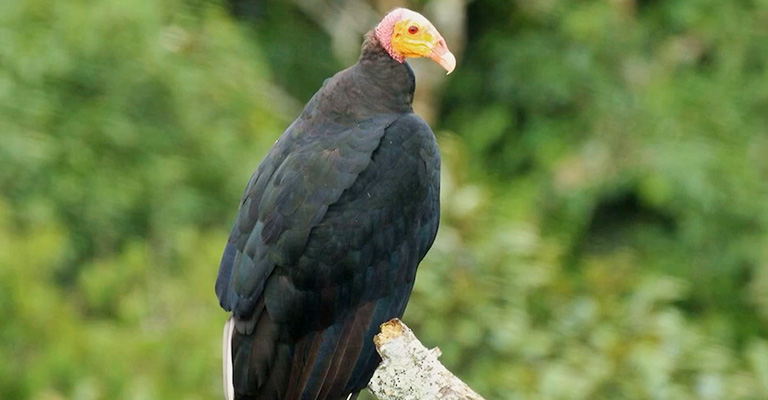
The greater yellow-headed vulture is a less common vulture species in Florida compared to black and turkey vultures. This species has a distinctive yellowish head, and its distribution is primarily limited to Central and South America.
However, there have been occasional sightings in southern Florida, particularly in the Everglades and the Florida Keys.
Lesser Yellow-headed Vulture (Cathartes burrovianus):
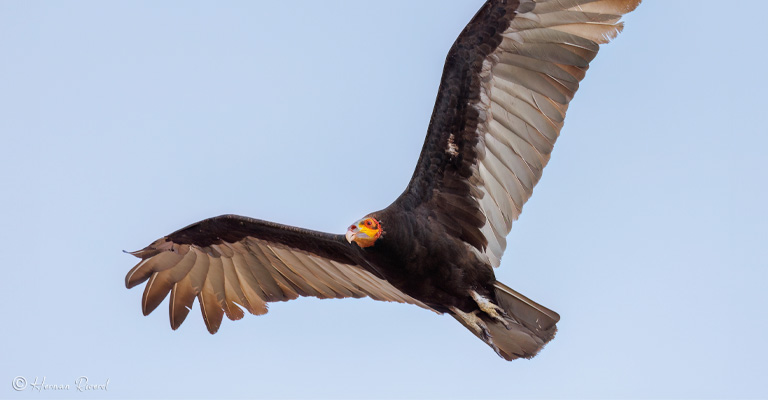
The lesser yellow-headed vulture is another vulture species primarily found in Central and South America.
While not as commonly observed as the black and turkey vultures in Florida, there have been occasional reports of sightings in southern parts of the state, similar to the greater yellow-headed vulture.
King Vulture (Sarcoramphus papa)
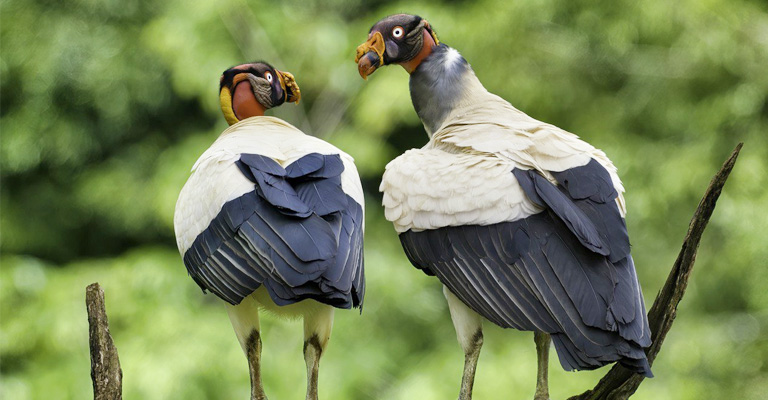
The king vulture is a striking and colorful vulture species known for its vibrant plumage. However, it is an extremely rare visitor to Florida. King vultures are typically found in the tropical forests of Central and South America.
Their presence in Florida is sporadic and usually associated with rare migratory occurrences.
Zone-tailed Hawk (Buteo albonotatus)
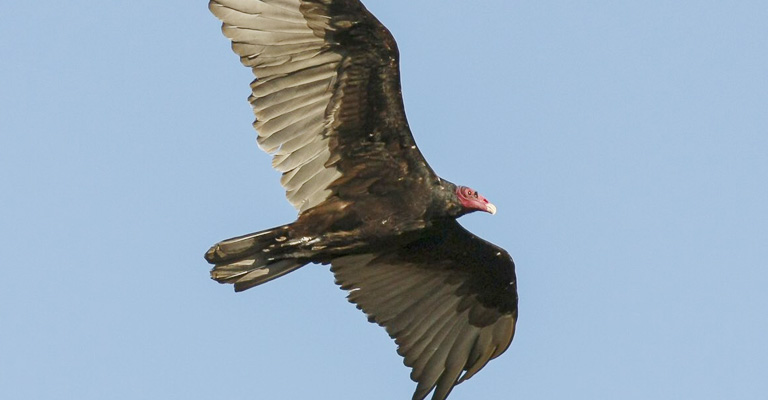
The zone-tailed hawk is a hawk species that closely resembles turkey vultures, particularly in flight. While it is not a vulture, it is worth mentioning because it can be mistaken for a vulture, contributing to potential misconceptions about vulture populations in Florida.
Is It Illegal to Shoot a Vulture in Florida?
Shooting a vulture in Florida, or any other part of the United States, is illegal due to federal and state regulations that protect these birds.
Vultures are migratory birds, and they are safeguarded by various laws designed to conserve their populations and maintain ecological balance.
Federal Protection
The primary federal law that protects vultures, including the black vulture and turkey vulture, is the Migratory Bird Treaty Act (MBTA).
The MBTA, enacted in 1918, is a landmark piece of legislation that prohibits the harming, capturing, or killing of over 1,000 species of migratory birds, including vultures. It was designed to conserve these birds and their habitats, recognizing their critical ecological roles.
Recognizing Vultures as Migratory Birds
Vultures are indeed migratory birds, although their migrations are not as extensive as those of some other species. The MBTA classifies migratory birds based on whether they cross state lines, or international borders, or are under the protection of international treaties.
Vultures, although often residing in Florida year-round, do qualify for protection under the MBTA due to their migratory nature and the potential for crossing state lines or international borders.
Ecological Importance
One of the primary reasons vultures are protected under the MBTA is their crucial role in maintaining ecological balance. Vultures are scavengers that feed on carrion, helping to prevent the spread of diseases and efficiently recycling nutrients in ecosystems.
By consuming carcasses, they play a valuable role in cleaning up the environment. Shooting vultures would disrupt this essential ecological service.
Penalties for Violating the MBTA
Violating the Migratory Bird Treaty Act can result in significant penalties. Individuals found guilty of harming or killing vultures or other protected migratory birds can face fines, imprisonment, or both, depending on the circumstances and the severity of the violation.
These penalties serve as a deterrent to prevent the unlawful killing of vultures.
State Protections
In addition to federal protections, vultures enjoy state-level legal safeguards in Florida. The Florida Fish and Wildlife Conservation Commission (FWC) enforces state laws that further protect vultures.
These laws reinforce the federal MBTA protections and make it clear that shooting vultures within the state is illegal.
Exceptions for Depredation Permits
There are specific circumstances under which depredation permits may be issued to legally address situations where vultures pose threats to property or public safety.
These permits are typically issued by the U.S. Fish and Wildlife Service and authorized agents in consultation with wildlife agencies.
Depredation permits allow for the non-lethal removal of vultures under controlled and regulated conditions. These permits are only granted when alternatives to resolve the issue are deemed impractical.
Ethical Considerations
Beyond the legal protections and penalties, there are ethical considerations associated with shooting vultures. Vultures, often misunderstood and maligned, are essential contributors to ecosystems.
Their role in carrion disposal helps maintain a healthy environment and prevent the spread of diseases. Shooting vultures not only violates legal protections but also disrupts the balance of nature and raises ethical concerns about cruelty to animals.
Alternatives to Address Issues
When vultures are causing issues, such as roosting on properties or posing minor threats, there are alternatives to lethal measures. Non-lethal deterrents can be employed to encourage vultures to relocate.
These measures can include visual deterrents, sound devices, or the use of safe, non-harmful substances that discourage vultures from specific areas.
FAQs
Why are vultures protected under the Migratory Bird Treaty Act?
Vultures, including black vultures and turkey vultures, are protected under the Migratory Bird Treaty Act due to their migratory nature and their vital ecological role.
Can I legally deter vultures from my property in Florida without harming them?
Yes, you can legally deter vultures from your property in Florida without harming them. Non-lethal deterrent methods are available, including visual deterrents, sound devices, and the use of non-harmful substances.
Are there any exceptions to shooting vultures under the law?
There are limited exceptions for shooting vultures under depredation permits. These permits are issued by the U.S. Fish and Wildlife Service and authorized agents in specific cases where vultures pose threats to property or public safety.
What are the penalties for violating the Migratory Bird Treaty Act by shooting vultures?
Violating the Migratory Bird Treaty Act by shooting vultures can result in significant penalties, including fines, imprisonment, or both. The severity of the penalty depends on the circumstances of the violation and the extent of harm caused to the protected birds.
Do vultures have any known natural predators in Florida?
Vultures have few natural predators in Florida. Their large size, soaring flight, and communal behavior make them challenging targets for other animals. In the wild, vultures are more likely to be threatened by environmental factors.
Conclusion
Vultures in Florida, including black vultures and turkey vultures, are protected under federal and state laws, making it illegal to harm or kill them.
The Migratory Bird Treaty Act (MBTA) provides essential protections for these birds due to their migratory nature and their vital role in maintaining ecological balance.
Shooting vultures not only carries significant legal penalties but also disrupts the balance of nature and poses ethical concerns.
Non-lethal deterrent methods and depredation permits offer alternatives to address issues with vultures, allowing property owners to mitigate conflicts without harming the birds.
These measures are essential in preserving the ecological services vultures provide, such as carrion disposal and disease prevention.
It is crucial for individuals in Florida and across the United States to be aware of these legal protections and to promote coexistence with vultures, recognizing their value in maintaining healthy ecosystems.
Respecting these protections and considering non-lethal alternatives ensures the well-being of vultures and the continued ecological balance in the region.